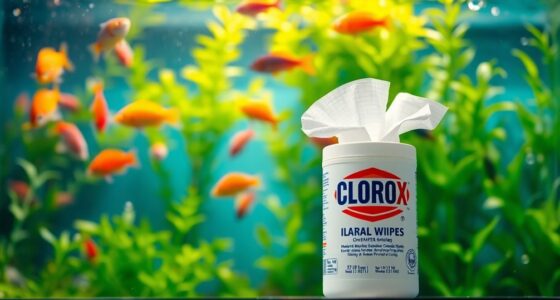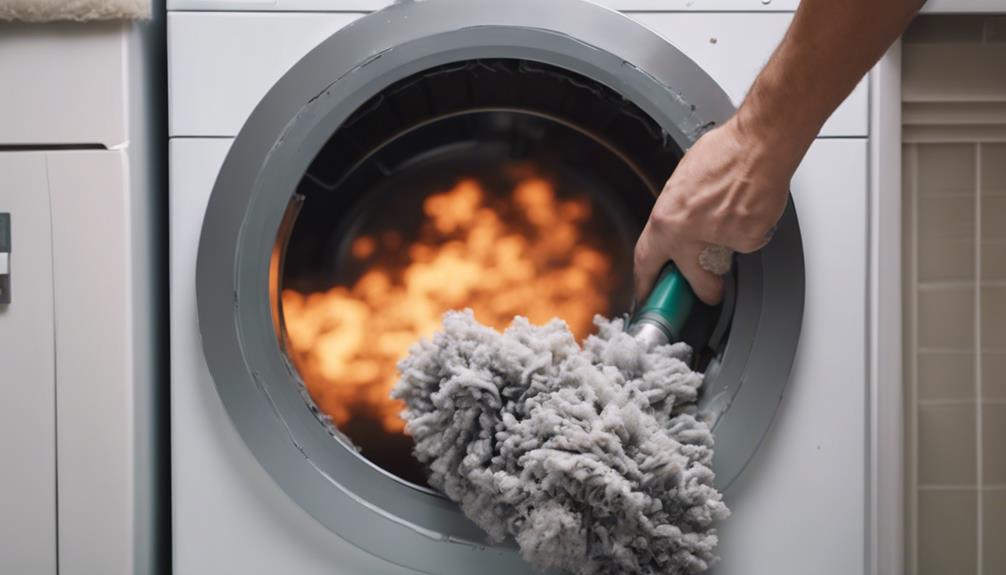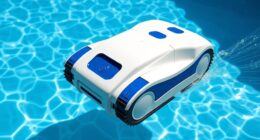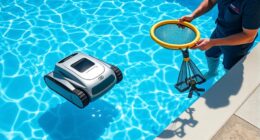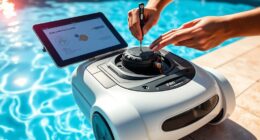Using WD-40 for cleaning guns might cause problems. It can lead to malfunctions and gumming up your firearm. The solvent properties aren't ideal for thorough cleaning. Firearms need specific solvents and lubricants. WD-40 attracts dust and debris, potentially causing issues. High-grade kerosene content can gum up mechanisms. To prevent cycling problems and operational failures, opt for products designed for firearms. Discover more about the risks and alternatives to keep your firearms in top shape.
Key Takeaways
- WD-40 is not ideal for gun cleaning due to potential malfunctions.
- Specific gun cleaning solvents and lubricants are recommended over WD-40.
- WD-40 can lead to gumming up gun mechanisms, causing jams.
- Risks include residue buildup, attracting debris and potential long-term damage.
- Opt for gun-specific oils like Rem Oil for proper lubrication and maintenance.
Is WD-40 Suitable for Gun Cleaning?
Using WD-40 for cleaning guns isn't recommended due to its solvent properties and potential for causing firearm malfunctions. While WD-40 can displace water in a gun, it isn't ideal for thorough gun cleaning.
The solvent nature of WD-40 can lead to gumming up firearm actions, causing jams, malfunctions, and long-term performance issues. To maintain your gun properly, it's advised to use solvents and lubricants specifically designed for firearms.
These products are formulated to clean and protect the internal components of the gun without risking damage or malfunctions. Although WD-40 may seem like a quick fix, using it for gun cleaning can result in internal gumming, affecting the gun's functionality over time.
For best results, it's recommended to follow up any use of WD-40 with appropriate cleaning solvents and oils designed for gun maintenance.
Potential Risks of Using WD-40

You should be aware of potential risks when using WD-40 on your firearms. Issues like dried shellac buildup, cycling problems, and fouling can occur.
Understanding how WD-40 may impact your ammunition, delicate components, and metal surfaces is crucial.
Risks Using WD-40
When cleaning guns with WD-40, be cautious of the potential risks associated with its high-quality kerosene content, which can lead to gumming up gun mechanisms.
Using WD-40 on firearms poses risks such as attracting dust and debris, which can affect ammunition and potentially cause malfunctions.
The residue left behind by WD-40 can result in long-term damage to your guns due to its non-lubricating properties.
It's vital to exercise caution when applying WD-40 to firearms to avoid issues like gumming up mechanisms and causing operational failures.
Remember that safety glasses are recommended when using potent liquid cleaners like WD-40 on guns to shield yourself from potential hazards.
Prioritize the maintenance and care of your firearms by understanding the risks involved in using WD-40 and taking preventive measures to ensure the longevity and best performance of your guns.
Concerns With WD-40
Be mindful of the potential risks associated with using WD-40 on firearms, particularly its high-grade kerosene content that can lead to gumming up gun mechanisms.
When considering the use of WD-40 for cleaning guns, it's vital to understand the potential risks involved. The high kerosene content in WD-40 can leave gummy residues on gun parts, attracting dust and debris that may cause malfunctions and cycling problems.
Using WD-40 on firearms can also affect ammunition and lead to long-term damage, impacting the overall performance of your gun. It's essential to exercise caution as WD-40 lacks proper lubricating properties, potentially resulting in residue build-up that can hinder your gun's functionality.
Alternatives to WD-40 for Firearms

You have choices when it comes to cleaning and maintaining your firearms.
Break Free CLP, Carb Cleaner, and Brake Cleaner are superior alternatives to WD-40 for gun cleaning.
These products offer better lubrication and protection for your firearms, ensuring top-notch performance.
Better Gun Cleaning Alternatives
Considering alternatives to WD-40 for cleaning your firearms can enhance the maintenance and longevity of your guns. When it comes to proper cleaning and lubrication, there are several effective alternatives to WD-40 that can help you keep your firearms in top condition. Here are some recommended options:
| Gun Cleaning Alternatives | Recommended for Proper Cleaning |
|---|---|
| Break Free CLP | Yes |
| Carb Cleaner | Yes |
| Brake Cleaner | Yes |
| Triflo | Yes |
| Aero-Kroil | Yes |
These alternatives, along with specific gun oils like Real Magic and Rem Oil, are better suited for maintaining your firearms compared to WD-40. Synthetic motor oils and marine grease are also effective lubricants for guns. Remember, using the right cleaning and lubricating products can significantly impact the performance and durability of your firearms.
Superior Firearm Lubricants
When looking for top-notch firearm lubricants as substitutes for WD-40, consider specific gun lubricants like Real Magic and Rem Oil. These products are recommended for their exceptional performance in maintaining firearms compared to WD-40.
Additionally, Ace Hardware's store brand spray lube has also gained recognition as an outstanding alternative for gun lubrication. Synthetic motor oils of varying weights have proven to be successful substitutes for WD-40, offering better lubrication for firearms.
For those seeking alternatives, marine grease and Cal Grease are suitable options, providing improved lubrication over WD-40 for different types of firearms. Furthermore, Camellia oil stands out as a suggested substitute for wiping down firearms, knives, and axes, delivering excellent protection when compared to WD-40.
With these alternatives readily available, it's crucial to choose exceptional firearm lubricants like Real Magic, Rem Oil, and other recommended products for the best gun maintenance.
Problems Caused by WD-40

Causing potential harm to various components of firearms, WD-40 poses several problems when used for cleaning guns. One significant issue is the harm it can inflict on plastic parts, triggers, and delicate components, leading to cycling problems and potential failures.
Additionally, WD-40's rust prevention properties may be inadequate, leaving firearms vulnerable to corrosion. Engraved firearms with gold foil accents are at risk of discoloration when exposed to WD-40, impacting their aesthetic appeal.
Guns with wood finishes are also not spared from harm, as WD-40 can cause damage to the wood. Despite its ability to dissolve shellac buildup, facilitating cleaning processes, the long-term consequences of this action may result in irreversible damage to the firearm.
Considering these potential drawbacks, it's essential to exercise caution when using WD-40 for gun maintenance to prevent these issues from occurring.
WD-40 for Gun Lubrication

Using WD-40 for gun lubrication can lead to various issues due to its solvent nature and quick evaporation properties. WD-40, designed as a water displacer and moisture remover, isn't ideal for long-term gun lubrication. Its rapid evaporation can cause cycling problems, fouling, and dried shellac buildup in firearms, affecting their performance.
Furthermore, WD-40 can penetrate primers and powders, potentially impacting the ammunition's reliability and accuracy.
To ensure proper maintenance and lubrication of your firearms, it's essential to use gun-specific oils like Real Magic, Rem Oil, or Yamalube Grease. These products are specifically formulated to provide the necessary lubrication and protection to gun parts without the adverse effects associated with using WD-40.
User Experiences With WD-40

Many gun owners have shared their experiences regarding the use of WD-40 on firearms, highlighting potential issues and lessons learned.
Some users have reported that WD-40 can gum up gun actions and lead to cycling problems, causing embarrassing firearm malfunctions. These user experiences emphasize the importance of using proper lubricants for firearms to avoid complications.
While WD-40 is effective for loosening tools and preventing rust on non-firearm items, it isn't recommended for gun maintenance due to the issues it may cause in gun mechanisms.
Lessons learned from using WD-40 on guns underscore the necessity of choosing appropriate lubricants specifically designed for firearms to ensure smooth operation and longevity.
Taking heed of these user experiences, it's essential to prioritize the use of proper gun lubricants to maintain the performance and reliability of your firearms.
Proper Gun Maintenance Recommendations

Stick to using gun-specific oils like Rem Oil or Ballistol for proper lubrication of firearms to achieve peak performance and longevity. Regular cleaning and maintenance are essential for best gun performance. Proper lubrication plays an important role in preventing wear and ensuring smooth operation. Avoid using WD-40 on guns as it may lead to issues like gumming up the action, potentially causing malfunctions.
Here is a simple guide for proper gun maintenance recommendations:
| Cleaning Frequency | Recommended Products | Maintenance Tips |
|---|---|---|
| After Each Use | Bore Snake for barrels, CLP for general cleaning | Inspect for wear or damage |
| Monthly | Gun-specific cleaning brushes and patches | Apply a light coat of gun oil to prevent rust |
| Every 500 Rounds | Deep cleaning kit for thorough maintenance | Check springs and screws for tightness |
WD-40 Characteristics and Risks

You should be aware that WD-40, while effective for water displacement and rust penetration, can potentially cause issues when used on guns.
It might lead to gumming up the action of your firearm, resulting in jams and malfunctions.
To avoid long-term damage, it's essential to follow up with proper gun cleaning solvents and lubricants after using WD-40 on your firearms.
WD-40 Properties
When examining the properties of WD-40, its role as a multi-purpose lubricant with water displacement capabilities must be acknowledged. WD-40 is known for its versatile nature and ability to penetrate rust, making it a popular choice for various maintenance tasks.
However, when it comes to firearms, WD-40 may not be the ideal solution due to specific concerns related to gun maintenance. Here are a few key properties of WD-40 to be considered in this situation:
- Multi-Purpose Lubricant: WD-40 serves as a lubricant for various applications beyond firearms, making it a handy product for general maintenance tasks.
- Water Displacement: Its ability to displace water can be beneficial for preventing rust and corrosion on metal surfaces, including guns.
- Rust Penetration: WD-40 can help penetrate and loosen rust, aiding in the cleaning and maintenance of firearms stored in less-than-ideal conditions.
While WD-40 offers certain advantages, its properties may not make it the best choice for maintaining guns in the long run, as discussed in the following sections.
Risks and Concerns
Using WD-40 for cleaning guns poses risks due to its characteristics and potential negative effects on firearms. WD-40's high-grade kerosene ingredient can leave gummy residues, attracting dust and gumming up mechanisms, which may lead to malfunctions and affect ammunition performance. Its non-lubricating properties and residue issues can cause long-term damage to firearms, making caution necessary when considering its use for gun maintenance. Safety glasses are recommended when using potent liquid cleaners like WD-40 to safeguard your eyes from any potential splashes or fumes.
| Risks and Concerns | Effects on Firearms | Precautions |
|---|---|---|
| Gummy residues | Attract dust, gum up mechanisms | Use proper lubricants |
| Malfunctions | Affect ammunition performance | Avoid using near ammo |
| Long-term damage | Non-lubricating properties | Regularly clean and oil guns |
Using WD-40 on Guns: User Concerns

Amid user concerns regarding the use of WD-40 on guns are reports of issues such as gumming up firearm actions and causing malfunctions.
When it comes to using WD-40 on your firearms, it's important to take into account the following:
- Potential for Issues: Users have experienced jams, cycling problems, and long-term damage in their guns after using WD-40.
- Recommendation for Alternatives: It's advisable to avoid using WD-40 on firearms due to the complications it may cause. Proper solvents and lubricants specifically designed for guns are a better choice for cleaning and lubrication.
- Removal Process: If WD-40 has already been applied to your gun, it can be eliminated by using additional WD-40 followed by appropriate cleaning and oiling to make sure the firearm functions properly.
Considering these user concerns and potential risks associated with WD-40, it's best to choose products that are formulated for gun maintenance to keep your firearms in top condition.
Products for Effective Gun Cleaning

Considering the importance of proper gun maintenance, exploring a range of effective products for cleaning and lubricating firearms can enhance the longevity and performance of your guns. Here are some reputable brands offering high-quality solutions for gun cleaning and lubrication:
| Brand | Products Available |
|---|---|
| Otis Technology | All-inclusive gun cleaning kits |
| BreakFree | Superior lubricants for firearms |
| Hoppes | Cleaning kits and lubricants for gun care |
| Wheeler | Specialized gun cleaning tools and kits |
These brands provide a variety of options tailored to meet different gun cleaning needs, ensuring that you can find the right products for your firearms. Whether you are looking for a complete cleaning kit or specialized lubricants, these trusted brands offer solutions to keep your guns in optimal condition. Remember, regular maintenance using quality products is key to preserving the performance and longevity of your firearms.
Frequently Asked Questions
Is WD-40 Good for Cleaning Firearms?
Using WD-40 for cleaning firearms is not recommended. It may lead to gun malfunctions and long-term issues like dried shellac buildup. Opt for solvents and lubricants designed for guns to avoid potential damage.
What's the Best Thing to Clean a Gun With?
When cleaning guns, use solvent designed for firearms. Opt for Otis Technology cleaning kits, BreakFree lubricant, Hoppes cleaning solutions, and Wheeler cleaning tools for effectiveness. Vedder Holsters Gun Cleaning Mat prevents scratches. Follow manufacturer's recommendations for longevity.
What Does the US Military Use to Clean Guns?
The US military primarily uses CLP (Cleaner, Lubricant, and Preservative) for cleaning and maintaining firearms. CLP is a multi-purpose product that cleans, lubricates, and protects firearms in one step, ensuring peak performance.
What Is the Best Material to Clean Guns With?
To clean guns effectively, use solvents and lubricants designed for firearms. Products like Otis Technology kits, BreakFree lubricant, Hoppes solutions, and Wheeler tools are recommended. Follow manufacturer guidelines for proper maintenance to guarantee gun longevity and performance.
Conclusion
So, the next time you want to clean your precious firearm, remember: using WD-40 may leave you with more than just a shiny gun.
Explore alternative options to avoid potential risks and maintain your weapon properly.
Don't let WD-40 be the villain in your gun cleaning saga – choose wisely and keep your firearms in top condition!



